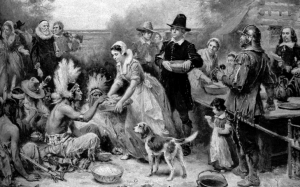|
History of Thanksgiving Day (US)

Go to: Thanksgiving
Day Main Page
|
Main History
Index Page
|
History of World Cuisines
Historical
Background History
In order to truly appreciate the foundations of
Thanksgiving day, it is necessary to go right back
to the beginning before the USA was colonised by
Europeans when members of the Separatist Church
which was a Puritan sect, fled their home in England
to escape religious persecution.
Initially, they went to The Netherlands where
enjoyed more religious tolerance. However the Dutch
way of life wasn�t to their liking with many of them
seeing it as profane, so in an effort to build a
better life, a group of them negotiated with a
London stock company to finance a pilgrimage to
America and eventually set sail aboard the Mayflower
in 1620.
It�s interesting to note that of the 102 people
aboard the Mayflower, around 60 persons did not
belong to this religious sect, but were hired to
protect the company's interests.
The First Thanksgiving
Having landed at Plymouth Rock in December 1620, by
the summer of 1621, the harsh conditions and their
lack of practical experience in farming the new
land, resulted in the pilgrim populace being
decimated, with almost half of them dying from
disease, much of which was the direct result of lack
of nutrients. It is now widely acknowledged that the
remaining settlers wouldn�t have made it without the
direct help of the native American Indians, who
taught them how to grow local crops, gather wild
edible foods, catch fish and seafood and hunt
wild animals.
In the Autumn of 1621, the settlers harvested a
bounty of crops and decided to celebrate, together
with the Wampanoag Indians who had helped them to
survive. The feast was similar to a traditional
English Harvest Festival and lasted three days.
Whilst there were other, perhaps earlier examples of
giving thanks to God, the celebrations at Plymouth
are considered my many as having been the first
Thanksgiving celebration by European settlers, and
thus the founder of today�s tradition.
What was eaten at the first Thanksgiving in 1621
Perhaps we should start with what wasn�t on the
menu. At that time, wheat wasn�t grown in the area
and any stocks of flour which had been taken on the
voyage to the new land were long gone by the autumn
of 1621. Furthermore, they didn�t have ovens. It is
therefore safe to say there wouldn�t have been any
wheat bread, pastries or the now traditional pumpkin
pie. As there were no domestic cows, there wouldn�t
have been any beef, milk or butter either.
As with the flour, any sugar they had brought along
was probably mostly gone, so there would have been
no sweetened cranberry sauce. Neither would there
have been corn on the cob as sweetcorn was mostly
dried for keeping or sweet potatoes.
They did however probably eat boiled pumpkin, which
apparently wasn�t an immediate hit with the
Europeans, a type of fried bread made from corn,
fish, wild fowl, berries, lobster, clams and venison
which may have been spit-roasted over an open fire.
It is also likely that they had taken spices such as
cinnamon, ginger, nutmeg, and pepper which they may
have used as seasonings as well as herbs.
The pilgrims used spoons, knives, and their fingers
but no forks and although salt was available on the
table pepper was only used during cooking and not as
a table condiment. All of the different dishes would
be served at the same time and diners ate them in
the order of their choice.
Below is an extract from "First Thanksgiving" by
Edward Winslow: A Journal of the Pilgrims at
Plymouth, in 1621 which gives a little insight into
the festivities which occurred some time between
21st September and 11th November.
"Our harvest being gotten in, our governor sent four
men on fowling, that so we might after a special
manner rejoice together after we had gathered the
fruit of our labors. They four in one day killed as
much fowl as, with a little help beside, served the
company almost a week. At which time, among other
recreations, we exercised our arms, many of the
Indians coming amongst us, and among the rest their
greatest king Massasoit, with some ninety men, whom
for three days we entertained and feasted, and they
went out and killed five deer, which they brought to
the plantation and bestowed upon our governor, and
upon the captain, and others. And although it be not
always so plentiful as it was at this time with us,
yet by the goodness of God, we are so far from want
that we often wish you partakers of our plenty
Thanksgiving through the Ages
Whilst many observed the practice of thanksgiving or
harvest celebrations after the 1621 festivities,
it wasn�t until 1789, shortly after the American
Revolution, that George Washington made a
proclamation which created the first Thanksgiving
Day to be the 26th November, recommending ��.a day
of public thanksgiving and prayer to be observed by
acknowledging with grateful hearts the many signal
favors of Almighty God especially by affording them
an opportunity peaceably to establish a form of
government for their safety and happiness.�
In 1863 during American Civil War, President Abraham
Lincoln, prompted by a crusade of editorials written
by Sarah Josepha Hale, proclaimed the last Thursday
in November as Thanksgiving Day and every president
since has issued a Thanksgiving Day proclamation.
In 1941 the U.S. Congress passed a bill requiring
that Thanksgiving Day be observed on the fourth
Thursday of November and in December 1941 President
Roosevelt signed the bill, making the date of
Thanksgiving a matter of federal law.
|
|